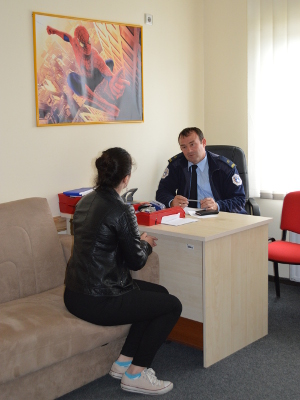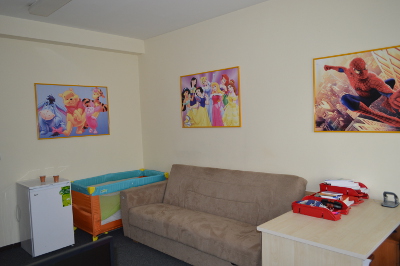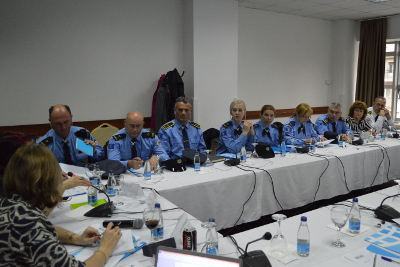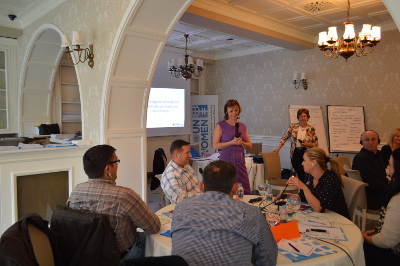Coordinated response gives Kosovo* domestic violence survivors hope
UN Women-supported project leads to Municipal Coordination Mechanisms and a more effective response by Kosovo’s police, judiciary, NGOs, shelters and other institutions working with domestic violence survivors.Date:

When her husband’s physical and psychological violence became unbearable, Dafina[1] went to the Domestic Violence Unit of the Kosovo Police. They interviewed her in a survivor-friendly investigation room that UN Women helped set up, where she could tell her story freely. They then escorted her and her baby daughter to a Safe House shelter, where they’ve now lived for seven months.
“If violence happens once, it will happen again. You must be courageous enough to end it before it gets worse and more dangerous – even if your husband is stronger than you, you should be brave and say, ‘Enough!’,” says Dafina.
Dafina will soon start a one-year paid internship organized by her shelter and the local employment office: “I have so many dreams I hope to fulfil: To get a job and become independent. To make the decisions for my life. To have a home and be with my daughter forever.”
Positive stories like Dafina’s happen more often now in Kosovo, since a UN Women-supported project in Kosovo has led to a better coordinated, more effective domestic violence response by police, the judiciary, NGOs, social welfare and Safe House shelters, and other institutions working with domestic violence survivors.

The project created Domestic Violence Municipal Coordination Mechanisms that aim to improve cooperation and coordination between all institutions involved in supporting domestic violence survivors. In addition, UN Women financed secure survivor-friendly investigation rooms in police stations so survivors and their children could safely report domestic violence in privacy.
Violence against women remains common in Kosovo. Domestic violence is stigmatized and often seen as a private matter, with most cases probably not reported – and possibly increasing. A recent study, No More Excuses, by the Kosovo Women’s Network, found that 68 per cent of women and 56 per cent of men said they’d suffered domestic violence – up from 40.9 per cent of women and 19.7 per cent of men in 2014.
The collaboration between the Domestic Violence Unit of the Kosovo Police and the Municipal Coordination Mechanisms – now operating in in seven municipalities – works very well.
“Over 90 per cent of women arriving to our shelter are sent by the Kosovo Police,” said Ms. Sakibe Doli, director of the Gjakova domestic violence shelter. “If a woman comes to the shelter alone, we tell the police about her case. If we call the police, they are at our shelter in 2-3 minutes.”

Since the establishment of the domestic violence units each Kosovo police station now has two domestic violence primary investigators – one female, one male – on call 24/7. They investigate and send cases to the prosecution office. In addition, on a central level one lieutenant and two sergeants cover domestic violence cases, as do two investigators regionally.
“The police and the Domestic Violence Units are involved in nearly every step the survivor goes through. Police are usually the first on the scene in domestic violence cases. They handle security for the survivor and any dependents. They investigate and bring survivors to medical care, shelters, the court or to the prosecutors,” says Kosovo Police Captain Tahire Haxhiolli, Director of the National Domestic Violence and Child Delinquency Units.
Officers working on domestic violence must attend a five-day specialized training course on domestic violence. Developed in 2010 with UN Women support, the mandatory training is given by the Kosovo Police Training Unit on Gender Equality, Women’s Human Rights and Human Security.

Although Kosovo’s domestic violence response is improving, challenges remain, particularly in the Serbian-majority towns in the North. Police are understaffed, and domestic violence investigators often overworked, forced to handle both domestic violence and other cases.
“The situation in the North, with many internally displaced people from other parts of Kosovo, makes things difficult for domestic violence survivors, police and investigators,” says Ms. Vesna Krivokapić, a domestic violence investigator in North Mitrovica. “The job is very demanding, with constant pressure. If they let us deal only with domestic violence cases, then we could better support vulnerable children and better deal with domestic violence.”
UN Women is working with the Kosovo Police to establish a special investigation room for domestic violence survivors in northern Kosovo and lobbying with the UN Kosovo Team and other stakeholders to set up a women’s shelter in northern Kosovo’s Serbian-majority towns. UN Women is also supporting municipalities as they develop domestic violence municipal action plans – a first for northern Kosovo.
[1] Name changed to protect survivor's identity and privacy.
* All references to Kosovo in this story shall be understood in full compliance with UN Security Council Resolution 1244 (1999)